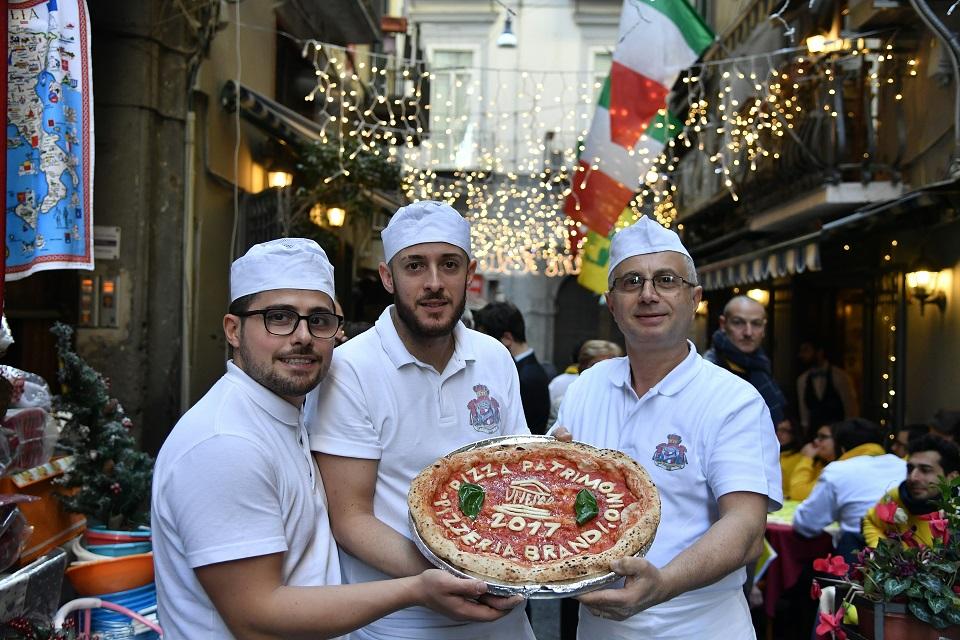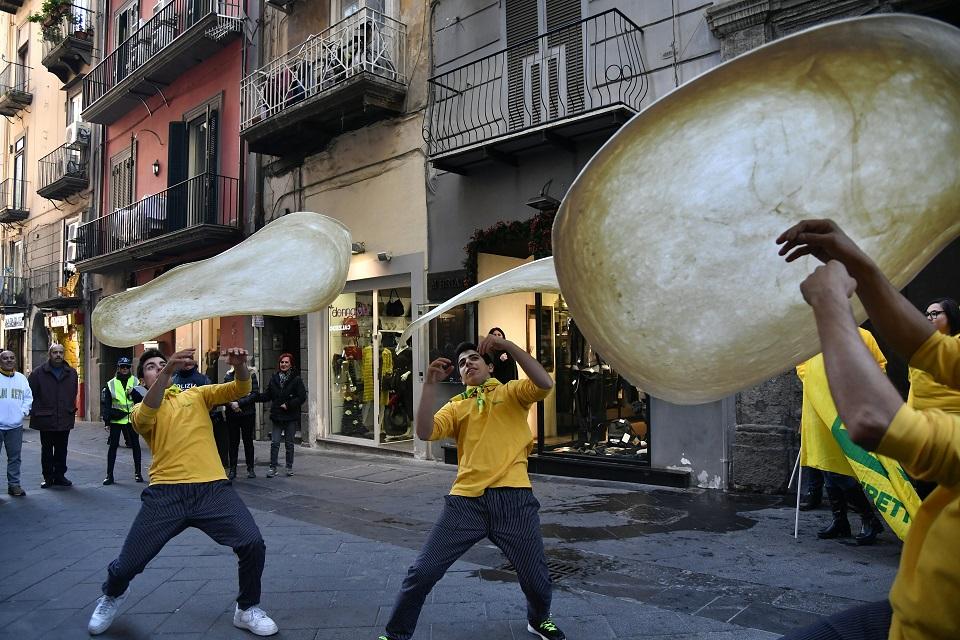Slice of pizza paradise as Naples fetes UNESCO triumph

Proud pizza-makers and eaters in the Italian city of Naples were so sure their historical speciality would win UNESCO heritage status that they were pounding the dough and chewing it up in celebration even before the distinction was announced on Thursday.
"After 250 years waiting, the pizza is UNESCO heritage! Congratulations Naples!" cried "pizzaiuolo," or Neapolitan pizza maker, Enzo Coccia, as crowds in the street outside the Sorbillo pizzeria erupted into cheers.
It didn't matter that the cultural body's World Heritage Committee was still hours away from declaring it "intangible heritage": for these specialists, there was no chance the world-famous dish could lose.
Ahead of Thursday's announcement, discs of floury dough flew through the air as jubilant pizzaiuoli feted their art of pizza making—from the wooden ovens used, to the spectacular handling of the mix to "oxygenate" it.
Passing families and youngsters whizzing by on scooters stopped to grab fresh slices dripping melted mozzarella as a man with a guitar burst into a song dedicated to the Italian delicacy.

Pizza for breakfast
With the news of the victory early Thursday morning, other chefs began handing out free pizza to locals and tourists in the southern city who paid homage to pizza's key social and cultural role.
"How perfect to celebrate with pizza for breakfast. The word pizza must be the most famous in the world, in every language, and now everyone knows we invented it!" said Marco Toeldo, 47, who was on his third slice.
Rita Rollen, a pensioner who stopped for a bite, said she was "really happy. Instead of the Camorra [the city's powerful mafia], we are being recognized for something positive for once! Something delicious."
Salvatore Stile earnestly said he hoped foreigners would now realize "a pizza somewhere like London is not the same, because the ingredients are not as good quality. Pizza making is a serious thing."
Pizza 'magic'
Down the centuries, the Neapolitan art of pizza making has been based "on a few key elements: water, flour, salt and yeast—and the excellent produce from the Campania countryside," pizza maker Coccia said as he pounded the dough.
"But it is also the hands, heart and soul of the pizzaiuolo which allow us to make magic," he added, describing the stretching and turning of the dough as "a love and passion that we transmit to others."
The pizza's humble ancestor, a plain affair usually tarted up with a bit of lard, was born less as an act of love than as a cheap, easy and fast way to feed the city's poor in the 18th century.
"In around 1750 the first pizza appeared in the taverns, after which people began to specialise" as pizza chefs, said historian Antonio Mattozzi.
"By the end of the 18th century, the first pizzerias were born."
But despite being an immediate hit with the locals, pizza failed to take off outside the city at first, he told AFP.
Trade secrets
The story goes that it was 19th-century Queen Margherita's love of the classic tomato, mozzarella and basil version that fired up the imagination and taste buds of diners far and wide.
Hoping to win the hearts of the commoners, the queen asked in 1889 to try their favorite dish. And while she was unconvinced by anchovy and Parmesan-topped versions, the basil delight won her over.
Legend has it the winning combination was put together by pizza maker Raffaele Esposito, who baked it in the royal pizza oven in the grounds of the stunning hill-top Capodimonte Palace.
The "Margherita" offered to the queen was recreated Wednesday in the 300-year old oven by pizzaiuoli who hold no truck with modern toppings like pineapple and are on a mission to defend the real thing.
"We are honored to pass on secrets and tips," Gino Sorbillo told AFP.
He said there were "youngsters from every culture who get in touch with us asking to learn, even sending us photographs of their pizza attempts online saying 'what did I do wrong?'"
Culture Minister Dario Franceschini, digging into a hot slice fresh from the royal oven, said that while "pizza has become a universal patrimony, many around the world don't even know it is Italian."
"This UNESCO decision will establish the truth once and for all: that pizza is a global food—but it was born in Naples, and in this very oven." — AFP




